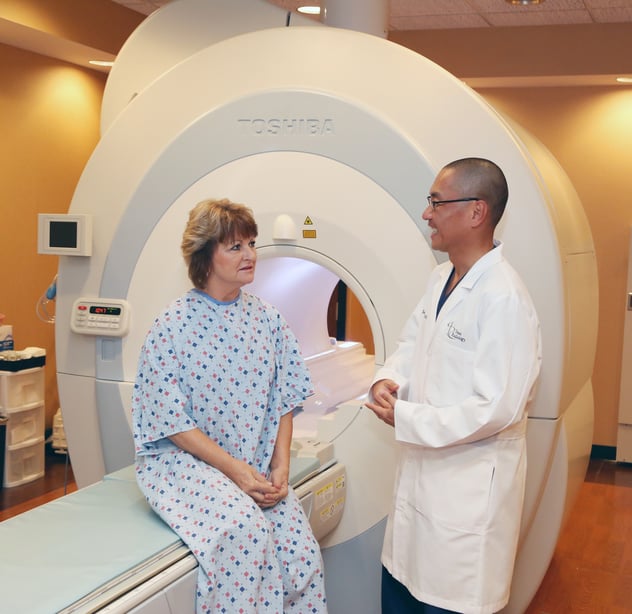
When you need to undergo a medical procedure, it’s natural to have a lot of questions. What is routine for healthcare providers often involves a great deal of new information for patients. In non-emergency situations, don’t hesitate to ask your provider to slow down and explain things at a pace you can follow, and make sure to ask any questions that you have before consenting to a procedure or taking a medication. In this article, we’ll look at medications that are commonly prescribed to help patients overcome claustrophobia and anxiety in order to successfully complete an MRI exam.
Procedural Sedation for MRI
MRI is among the safest imaging technologies available because, unlike X-ray or CT scans, MRI does not use ionizing radiation. It’s not uncommon, however, for patients who are prone to claustrophobia to experience intense anxiety during an MRI scan. When patients are unable to remain still in an MRI machine for prolonged periods due to claustrophobia or other conditions, procedural sedation can enable them to endure the experience and get the valuable information that MRI can provide.
Oral Benzodiazepines
If you are among those who suffer from claustrophobia or a high level of anxiety, discuss your options with your doctor. For moderate anxiety, your physician may prescribe a benzodiazepine, such as Xanax, Ativan, or Valium. If so, you will take this medication prior to your exam, according to your doctor’s instructions. If you receive one of these or any other sedative to help you tolerate the procedure, you will have to refrain from driving while under its influence and arrange for a safe ride home from your exam.
Benzodiazepines are often prescribed for anxiety and appear to work by enhancing the effects of the neurotransmitter GABA, which suppresses nerve activity. Common side effects of benzodiazepines include dizziness, drowsiness, weakness, and loss of equilibrium. Other reported effects include sleep disturbance, depression, disorientation, confusion, headache, and aggression. Because benzodiazepines can create physical dependence, it is important to take them only as needed and under a doctor’s care.[1]
IV Sedation
If you experience more severe claustrophobia-related symptoms, your doctor may instead recommend intravenous sedation. Typically, most out-patient clinics do not offer IV sedation, however, if necessary you can seek out IV sedation for claustrophobia at locations in a hospital setting. It's common to use a combination of Versed (a benzodiazepine) and Fentanyl, an opioid medication commonly prescribed for pain and sedation. You must have a physical and medical history within 30 days prior to your MRI in order to ensure the safety of these medications. Make sure to tell your doctor about all of your current medications and existing medical conditions.
Versed
Note that you should avoid Versed if you have narrow-angle glaucoma, if you’re pregnant, or if you have had an allergic reaction to benzodiazepines. Because Versed can amplify the effects of alcohol, avoid alcohol for the remainder of the day after receiving the medication. Grapefruit and grapefruit juice can also have harmful interactions with this drug.[2]
Fentanyl
Many medications, especially those that cause drowsiness or suppress breathing, can produce dangerous effects when taken after receiving Fentanyl, so it’s very important to discuss all medications that you take, including vitamins, over-the-counter remedies, and herbal supplements, with your doctor.[3]
While under IV sedation, your vital signs will be carefully monitored so that any adverse reactions you may experience can be promptly treated.
At Iowa Radiology, we use wide-bore MRI to reduce the feeling of confinement that patients feel during the procedure. We also strive to give you the information you need to make the best health care choices for yourself and your family. For more information about MRI, click the link below to download our free eBook guide, which has information about uses of the procedure, contraindications, risks, preparation, and more. Also feel free to browse our blog or additional resources in our library.
Note: Iowa Radiology does not offer IV conscious sedation. Please check with your local hospital to see if they can accommodate sedation for an MRI.
Sources
[1] Ogbru. "Benzodiazepines." RxList.com. RxList Inc., n.d. Web. 24 May 2016.
[2] "Versed." Drugs.com. Drugs.com, n.d. Web. 24 May 2016.
[3] "Fentanyl." Drugs.com. Drugs.com, n.d. Web. 24 May 2016.
The information contained in the Iowa Radiology website is presented as public service information only. It is not intended to be nor is it a substitute for professional medical advice. You should always seek the advice of your physician or other qualified healthcare provider if you think you may have a medical problem before starting any new treatment, or if you have any questions regarding your medical condition.
Iowa Radiology occasionally supplies links to other web sites as a service to its readers and is not in any way responsible for information provided by other organizations.


